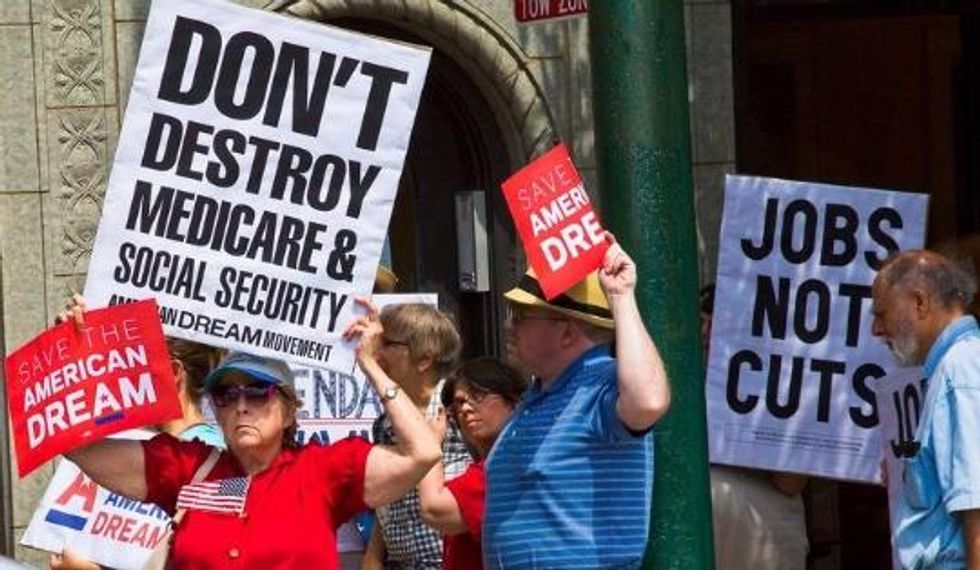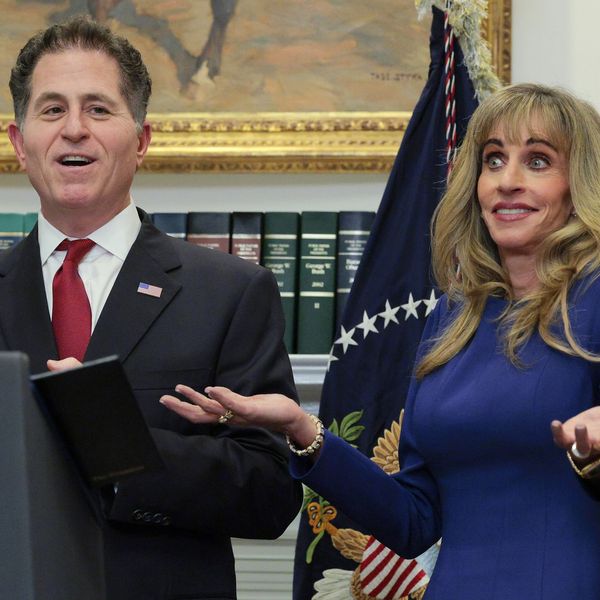How Entitlements for the Rich Cheat the Rest of Us
The word 'entitlement' is ambiguous.
Feb 10, 2014

The sense of entitlement among the very rich is understandable, for it helps them to justify the massive redistribution of wealth that has occurred over the past 65 years, especially in the past 30 years. National investment in infrastructure, technology, and security has made America a rich country. The financial industry has used our publicly-developed communications technology to generate trillions of dollars in new earnings, while national security protects their interests. The major beneficiaries have convinced themselves they did it on their own. They believe they're entitled to it all.
Their entitlements can be summarized into four categories, each of which reveals clear advantages that the very rich take for granted.
1. Income: Mocking Our 'Progressive' Tax System
Americans who earn millions of dollars a year feel entitled to the same maximum tax rate as those making about $400,000 a year. Progressive taxation stops at that point. In fact, it reverses itself, with the highest earners paying lower tax rates. The richest 10% pay about 20 percent in federal taxes, and it goes down from there, with the richest 400 paying less than 20 percent. When all taxes are included (payroll, sales, state and local), the super-rich pay about the same percentage as America's middle and upper-middle classes.
Corporations feel entitled to lower taxes, too, having cut their income tax rate in half in just ten years. The companies that have benefited the most from public research have become skilled tax avoiders.
Some corporate CEOs feel entitled to total freedom from taxes, employing a noble-sounding strategy of a $1 per year salary to avoid federal income taxes. It allows them to defer all capital gains taxes on their stock holdings, which can be used, if cash is needed, as collateral for low-interest loans.
2. Wealth: Trillions in Financial Gains, Zero Tax
America has gained $16 trillion in financial wealth over the past five years, with 80-90 percent of that gain going to the richest 10%, for many of whom productive labor may have been limited to checking their online portfolios. America is gaining in wealth because of technological infrastructure and a deregulated financial industry that uses the technology to capture most of those gains.
There is no tax on all that wealth. Capital gains can be deferred indefinitely, and then another entitlement comes into play: the lower capital gains rate, purportedly meant to stimulate new business investment, but in large part failing to do that. The nation's wealth needs to be distributed more equitably among productive citizens, ideally by allowing everyone to share in the capital of companies that use our nationally developed technologies.
3. Financial Transactions: Trillions in Speculative Purchases, Zero Tax
As Forbes notes, the hundreds of trillions of dollars of speculative financial transactions constitute "a massive financial accident waiting to happen, yet again."
We pay a sales tax of up to 10 percent on boots and mittens for the kids, But not a penny of sales tax is paid on U.S. financial transactions, which may be valued as high as three quadrillion dollars annually, or over three thousand times the deficit. No sales tax is paid despite the high-risk nature of "flash trading" that can lose entire pension funds in a few seconds.
The trading industry feels entitled to tax-free purchases, claiming that even a tiny sales tax will decrease liquidity, or slow the economy, or constitute a sin tax. Yet it's an easily administered tax that has been imposed in some of the freest economies in the world.
4. Subsidies: Alms for the Rich
About two-thirds of nearly $1 trillion in individual "tax expenditures" (deductions, exemptions, exclusions, credits, capital gains, and loopholes) goes to the top quintile of taxpayers.
At the corporate level, tens of billions of dollars go in subsidies to the fossil fuel, fishing, and agricultural industries. Fossil fuel subsidies may be much, much more. The IMF reports U.S. fossil fuel subsidies of $502 billion, and according to Grist, even this is an underestimate.
Cheated
There's more. A regressive payroll tax, an almost nonexistent estate tax, the lower capital gains rate on carried interest for investment managers, trillions socked away in tax havens -- all involve tax avoidance by wealthy Americans who feel entitled to their privileged positions.
Entitlements for the rich mean cuts in safety net programs for children, women, retirees, and low-income families. They threaten Social Security. They redirect money from infrastructure repair, education, and job creation.
And the more the super-rich take from us, the greater their belief that they're entitled to the wealth we all helped to create.
An Urgent Message From Our Co-Founder
Dear Common Dreams reader, The U.S. is on a fast track to authoritarianism like nothing I've ever seen. Meanwhile, corporate news outlets are utterly capitulating to Trump, twisting their coverage to avoid drawing his ire while lining up to stuff cash in his pockets. That's why I believe that Common Dreams is doing the best and most consequential reporting that we've ever done. Our small but mighty team is a progressive reporting powerhouse, covering the news every day that the corporate media never will. Our mission has always been simple: To inform. To inspire. And to ignite change for the common good. Now here's the key piece that I want all our readers to understand: None of this would be possible without your financial support. That's not just some fundraising cliche. It's the absolute and literal truth. We don't accept corporate advertising and never will. We don't have a paywall because we don't think people should be blocked from critical news based on their ability to pay. Everything we do is funded by the donations of readers like you. Will you donate now to help power the nonprofit, independent reporting of Common Dreams? Thank you for being a vital member of our community. Together, we can keep independent journalism alive when it’s needed most. - Craig Brown, Co-founder |
Our work is licensed under Creative Commons (CC BY-NC-ND 3.0). Feel free to republish and share widely.
Paul Buchheit
Paul Buchheit is an advocate for social and economic justice, and the author of numerous papers on economic inequality and cognitive science. He was recently named one of 300 Living Peace and Justice Leaders and Models. He is the author of "American Wars: Illusions and Realities" (2008) and "Disposable Americans: Extreme Capitalism and the Case for a Guaranteed Income" (2017). Contact email: paul (at) youdeservefacts.org.

The sense of entitlement among the very rich is understandable, for it helps them to justify the massive redistribution of wealth that has occurred over the past 65 years, especially in the past 30 years. National investment in infrastructure, technology, and security has made America a rich country. The financial industry has used our publicly-developed communications technology to generate trillions of dollars in new earnings, while national security protects their interests. The major beneficiaries have convinced themselves they did it on their own. They believe they're entitled to it all.
Their entitlements can be summarized into four categories, each of which reveals clear advantages that the very rich take for granted.
1. Income: Mocking Our 'Progressive' Tax System
Americans who earn millions of dollars a year feel entitled to the same maximum tax rate as those making about $400,000 a year. Progressive taxation stops at that point. In fact, it reverses itself, with the highest earners paying lower tax rates. The richest 10% pay about 20 percent in federal taxes, and it goes down from there, with the richest 400 paying less than 20 percent. When all taxes are included (payroll, sales, state and local), the super-rich pay about the same percentage as America's middle and upper-middle classes.
Corporations feel entitled to lower taxes, too, having cut their income tax rate in half in just ten years. The companies that have benefited the most from public research have become skilled tax avoiders.
Some corporate CEOs feel entitled to total freedom from taxes, employing a noble-sounding strategy of a $1 per year salary to avoid federal income taxes. It allows them to defer all capital gains taxes on their stock holdings, which can be used, if cash is needed, as collateral for low-interest loans.
2. Wealth: Trillions in Financial Gains, Zero Tax
America has gained $16 trillion in financial wealth over the past five years, with 80-90 percent of that gain going to the richest 10%, for many of whom productive labor may have been limited to checking their online portfolios. America is gaining in wealth because of technological infrastructure and a deregulated financial industry that uses the technology to capture most of those gains.
There is no tax on all that wealth. Capital gains can be deferred indefinitely, and then another entitlement comes into play: the lower capital gains rate, purportedly meant to stimulate new business investment, but in large part failing to do that. The nation's wealth needs to be distributed more equitably among productive citizens, ideally by allowing everyone to share in the capital of companies that use our nationally developed technologies.
3. Financial Transactions: Trillions in Speculative Purchases, Zero Tax
As Forbes notes, the hundreds of trillions of dollars of speculative financial transactions constitute "a massive financial accident waiting to happen, yet again."
We pay a sales tax of up to 10 percent on boots and mittens for the kids, But not a penny of sales tax is paid on U.S. financial transactions, which may be valued as high as three quadrillion dollars annually, or over three thousand times the deficit. No sales tax is paid despite the high-risk nature of "flash trading" that can lose entire pension funds in a few seconds.
The trading industry feels entitled to tax-free purchases, claiming that even a tiny sales tax will decrease liquidity, or slow the economy, or constitute a sin tax. Yet it's an easily administered tax that has been imposed in some of the freest economies in the world.
4. Subsidies: Alms for the Rich
About two-thirds of nearly $1 trillion in individual "tax expenditures" (deductions, exemptions, exclusions, credits, capital gains, and loopholes) goes to the top quintile of taxpayers.
At the corporate level, tens of billions of dollars go in subsidies to the fossil fuel, fishing, and agricultural industries. Fossil fuel subsidies may be much, much more. The IMF reports U.S. fossil fuel subsidies of $502 billion, and according to Grist, even this is an underestimate.
Cheated
There's more. A regressive payroll tax, an almost nonexistent estate tax, the lower capital gains rate on carried interest for investment managers, trillions socked away in tax havens -- all involve tax avoidance by wealthy Americans who feel entitled to their privileged positions.
Entitlements for the rich mean cuts in safety net programs for children, women, retirees, and low-income families. They threaten Social Security. They redirect money from infrastructure repair, education, and job creation.
And the more the super-rich take from us, the greater their belief that they're entitled to the wealth we all helped to create.
Paul Buchheit
Paul Buchheit is an advocate for social and economic justice, and the author of numerous papers on economic inequality and cognitive science. He was recently named one of 300 Living Peace and Justice Leaders and Models. He is the author of "American Wars: Illusions and Realities" (2008) and "Disposable Americans: Extreme Capitalism and the Case for a Guaranteed Income" (2017). Contact email: paul (at) youdeservefacts.org.

The sense of entitlement among the very rich is understandable, for it helps them to justify the massive redistribution of wealth that has occurred over the past 65 years, especially in the past 30 years. National investment in infrastructure, technology, and security has made America a rich country. The financial industry has used our publicly-developed communications technology to generate trillions of dollars in new earnings, while national security protects their interests. The major beneficiaries have convinced themselves they did it on their own. They believe they're entitled to it all.
Their entitlements can be summarized into four categories, each of which reveals clear advantages that the very rich take for granted.
1. Income: Mocking Our 'Progressive' Tax System
Americans who earn millions of dollars a year feel entitled to the same maximum tax rate as those making about $400,000 a year. Progressive taxation stops at that point. In fact, it reverses itself, with the highest earners paying lower tax rates. The richest 10% pay about 20 percent in federal taxes, and it goes down from there, with the richest 400 paying less than 20 percent. When all taxes are included (payroll, sales, state and local), the super-rich pay about the same percentage as America's middle and upper-middle classes.
Corporations feel entitled to lower taxes, too, having cut their income tax rate in half in just ten years. The companies that have benefited the most from public research have become skilled tax avoiders.
Some corporate CEOs feel entitled to total freedom from taxes, employing a noble-sounding strategy of a $1 per year salary to avoid federal income taxes. It allows them to defer all capital gains taxes on their stock holdings, which can be used, if cash is needed, as collateral for low-interest loans.
2. Wealth: Trillions in Financial Gains, Zero Tax
America has gained $16 trillion in financial wealth over the past five years, with 80-90 percent of that gain going to the richest 10%, for many of whom productive labor may have been limited to checking their online portfolios. America is gaining in wealth because of technological infrastructure and a deregulated financial industry that uses the technology to capture most of those gains.
There is no tax on all that wealth. Capital gains can be deferred indefinitely, and then another entitlement comes into play: the lower capital gains rate, purportedly meant to stimulate new business investment, but in large part failing to do that. The nation's wealth needs to be distributed more equitably among productive citizens, ideally by allowing everyone to share in the capital of companies that use our nationally developed technologies.
3. Financial Transactions: Trillions in Speculative Purchases, Zero Tax
As Forbes notes, the hundreds of trillions of dollars of speculative financial transactions constitute "a massive financial accident waiting to happen, yet again."
We pay a sales tax of up to 10 percent on boots and mittens for the kids, But not a penny of sales tax is paid on U.S. financial transactions, which may be valued as high as three quadrillion dollars annually, or over three thousand times the deficit. No sales tax is paid despite the high-risk nature of "flash trading" that can lose entire pension funds in a few seconds.
The trading industry feels entitled to tax-free purchases, claiming that even a tiny sales tax will decrease liquidity, or slow the economy, or constitute a sin tax. Yet it's an easily administered tax that has been imposed in some of the freest economies in the world.
4. Subsidies: Alms for the Rich
About two-thirds of nearly $1 trillion in individual "tax expenditures" (deductions, exemptions, exclusions, credits, capital gains, and loopholes) goes to the top quintile of taxpayers.
At the corporate level, tens of billions of dollars go in subsidies to the fossil fuel, fishing, and agricultural industries. Fossil fuel subsidies may be much, much more. The IMF reports U.S. fossil fuel subsidies of $502 billion, and according to Grist, even this is an underestimate.
Cheated
There's more. A regressive payroll tax, an almost nonexistent estate tax, the lower capital gains rate on carried interest for investment managers, trillions socked away in tax havens -- all involve tax avoidance by wealthy Americans who feel entitled to their privileged positions.
Entitlements for the rich mean cuts in safety net programs for children, women, retirees, and low-income families. They threaten Social Security. They redirect money from infrastructure repair, education, and job creation.
And the more the super-rich take from us, the greater their belief that they're entitled to the wealth we all helped to create.
We've had enough. The 1% own and operate the corporate media. They are doing everything they can to defend the status quo, squash dissent and protect the wealthy and the powerful. The Common Dreams media model is different. We cover the news that matters to the 99%. Our mission? To inform. To inspire. To ignite change for the common good. How? Nonprofit. Independent. Reader-supported. Free to read. Free to republish. Free to share. With no advertising. No paywalls. No selling of your data. Thousands of small donations fund our newsroom and allow us to continue publishing. Can you chip in? We can't do it without you. Thank you.

